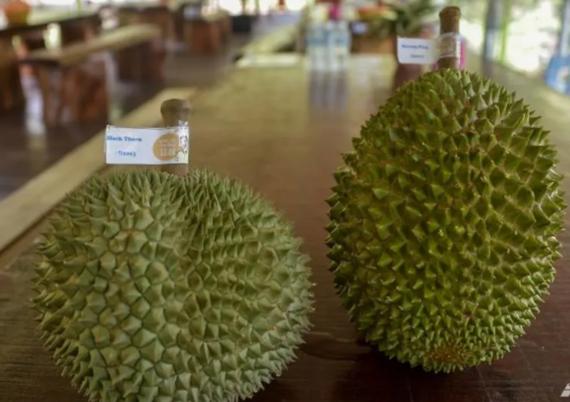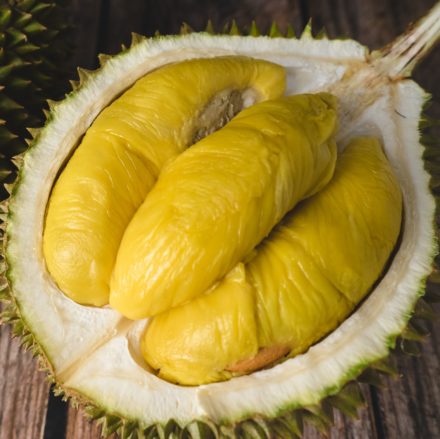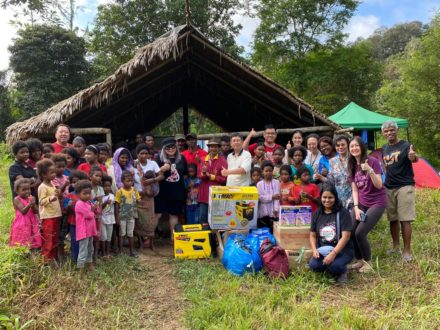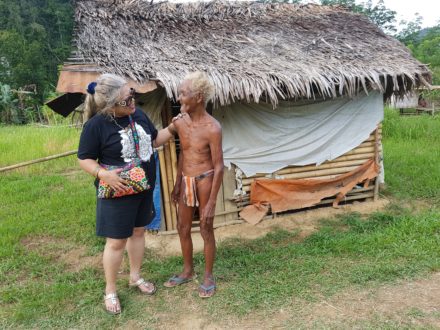
Musang Durian
WITHOUT RAINFOREST we do not have oxygen to breathe. We do not have food to eat either as biodiversity collapses and precious pollinators are pushed to the brink of extinction. Indigenous people are on the front line of environmental destruction. If we protect them and their way of life, we protect everyone on this planet – even those of us living in urban areas.
It is difficult for most of us to make the connection intellectually, and emotionally without seeing the impact with our own eyes.

Highly prized Musang Durian or ‘Mao Shan Wang’, known as the King of the fruits.
Durian production in Malaysia is destroying the native Malaysian rainforest at an alarming rate and contributing to human rights abuses of the local indigenous people, the Orang Asli.
Durian is growing all over SE Asia but new wealthy markets in China and other SE Asian countries prize Malaysian Musang above all other types. Anyone who loves Durian knows that it has a kind of addictive quality- once you get the taste for it you will travel far and wide to get it. And business is booming as middle classes across Asia are willing to fork out top dollar for the so-called ‘King of the Fruits.’

A community from the Bateq tribe of Orang Asli in Malaysia.
As awareness grows about palm oil, private companies owned by very wealthy individuals switch to the prized Musang durian.
“The EU (European Union) is giving us problems (over palm oil) so we are changing our strategy a little,” said Hisham Mahmood, a durian fan and a director at publicly listed oil palm company PLS Plantations to Al Jazeera.
But it is not only palm oil plantations that switching to durian to sell to places such as China and Singapore, but fresh virgin forest is being logged and sold to grow durian.
Malaysian politicians are allowing this to happen, even defying international definitions of native forest and international regulations for their own gain. They say a tree is a tree.
In the Malaysian peninsula, the federal government is taking the Kelantan government to court in order to protect the rights of the indigenous people. Apparently, this is a world first. But the corporations are rich and delay tactics are in their favour.

A Temier Orang Asli elder meets with human rights activist Siti Kasim, Chair for the committee for Orang Asli (COAR).
This rapid destruction of forests is driven to feed our insatiable appetites for everything from furniture to face creams to fruits. Durian is just the latest boom to add to a long list of produce grown in the global south.
Rapidly growing sectors like Musang Durian are no better than their predecessors in mining and palm oil – rife with systemic corruption, thugs, and expensive lawyers able to use delay tactics in the courts against NGOs.
There are many reported cases across the peninsula where companies use thugs to intimidate Orang Asli youth activists to move them off land that has been protected under British treaties – whilst using other impoverished Orang Asli as cheap day labour to log and tend to plantations heavily guarded with CCTV, security and helipads. There are people getting very rich from Durian, but there are few benefits for the Orang Asli as their land, health, identity and rights are stripped away.

The large flying fox is also known as the Malaysian flying fox, large fruit bat, kalang, or kalong, is a megabat in the family Pteropodidae.
Orang Asli elders are reporting how logging is infringing on their land – and what is worse, the logging is licensed by government officials. Yet this short termism is a threat to itsself – it’s a matter of decades before the durian industry cannibalizes itself along with other local agriculture by destroying the pollinators cheap Orang Asli labour it relies on.
“That’s them at it again,” says an Orang Asli man in his 40s who has lived at the village all his life. “Clearing forests to make way for more durian farms. The sound gets louder each day.”
They are rapidly cutting native forest with no intention of stopping. By buying Musang Durian without knowing it’s source – we may be participating in human rights violations as well as the mass destruction of biodiversity.
